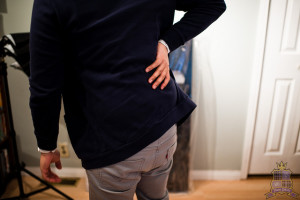 When I first meet someone and they find out I am a Chiropractor there is a response I sometimes get that I dread. “Oh you’re a Chiropractor? I have back pain so I adjust myself all the time.” Then they proceed to twist their spine or even worse grab their head and torque their neck making popping noises. “See I can do what you do to myself.”
When I first meet someone and they find out I am a Chiropractor there is a response I sometimes get that I dread. “Oh you’re a Chiropractor? I have back pain so I adjust myself all the time.” Then they proceed to twist their spine or even worse grab their head and torque their neck making popping noises. “See I can do what you do to myself.”
This always makes me cringe and I usually ask if they have an at home dental kit they also use so they never need to visit a Dentist. “Hey Cletus get the needle nose pliers, Bubba’s got a sore tooth!” Maybe they even have an at home proctology set. Best not to even think about that one.
There is a reason, as Chiropractors, we spend 5 years in school after our undergraduate studies learning how to properly evaluate, care for, and which techniques to utilize with patients. Even after all of this training I still need to see another Chiropractor for my adjustments. I wouldn’t think of trying to adjust myself. Yet people with no training at all think they can.
This recent research paper focused on a 17 year old boy who injured his back playing sports and had constant back pain. Before coming to the Chiropractor he would manipulate his spine by twisting his torso and “popping” his lower back. He said this would give him about a half hour of relief and then he would do it again. This means he was cracking his spine dozens of times per day. Not surprisingly even after his thorough exam, diagnosis, and plan of self treatment, his pain continued to get worse over the course of a year.
When he finally decided to see a Chiropractor our self treating athlete was in constant pain and having difficulty participating in sports and daily activities. The Chiropractor agreed to examine and treat him as long as he agreed to stop manipulating his spine himself, which he did.
There were some interesting findings from the initial exam the Chiropractor performed. First the Chiropractor noted his lower back had an overall increase in his range of motion. Usually when someone has low back pain they will have a decrease in their range of motion as the body tries to control movement to limit further damage. Constantly cracking his spine may have given him this increased range of motion; but before we congratulate him with an advance to write his Self Chiropractic Care for Dummies book understand there is more to the story. While there was an overall increase in the amount he could move when the Chiropractor evaluated the range of motion in each of the individual bones in his lower back he found joints that had a decrease in range of motion.
Your lower back is made up of 5 bones or vertebrae. Each has several joints that connect it to the vertebra above and below. The only way to have a decrease in motion in some of these joints but an overall increase in motion of the area as a whole is that some of the joints are now hyper-mobile, meaning they move too much and are unstable. This hyper-mobility and instability is why he was getting temporary relief from self manipulating but his pain levels overall kept getting worse.
A specific adjustment by a Chiropractor focuses only on the joints in the spine which are not moving properly. This restores normal range of motion to the joints which are stuck or misaligned while not affecting the joints which were moving properly or in this case were moving too much. Our patient in this case was seen 2-3 times per week for 3 months. At each of his visits he would receive Chiropractic adjustments when needed and was instructed to use a brace to help with the instability he caused by self manipulating. After his initial care plan his visit frequency was decreased and his pain was completely resolved.
This is a great case showing why treatment of your spine should be left to the professionals. You wouldn’t perform your own dental work and you shouldn’t try to be an at home Chiropractor either.
It’s as simple as that.
Dr Scott Szela
ref: A. Vertebral Subluxation Res. April 22, 2015
Pingback: What really happens if Scoliosis is left untreated? - Research for all of us